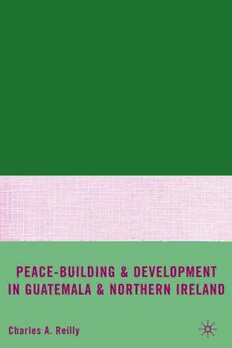
Peace-Building and Development in Guatemala and Northern Ireland PDF
235 Pages·2008·1.531 MB·English
Most books are stored in the elastic cloud where traffic is expensive. For this reason, we have a limit on daily download.
Preview Peace-Building and Development in Guatemala and Northern Ireland
Description:
This book analyzes the implementation of peace processes in Northern Ireland and Guatemala, with emphasis on the role of mid-level civil society and religious organizations, or “the voluntary sector.” Both countries interrupted years of conflict, signed peace accords in 1998 and 1996 respectively, and still struggle to make them work. Despite very different economic development levels, both countries have colonial legacies, deep cultural divisions, and engaged diaspora. They grapple with violence, poverty and inequitable distribution of wealth and power. While religious differences are a backdrop to violence and reconciliation in both cases, insecurity and inequity are the root cause and consequence of these conflicts. The book summarizes lessons learned and makes policy recommendations for more civil post-conflict societies, arguing that similar dynamics fuel sustainable peace-building and authentic development.
See more
The list of books you might like
Most books are stored in the elastic cloud where traffic is expensive. For this reason, we have a limit on daily download.
